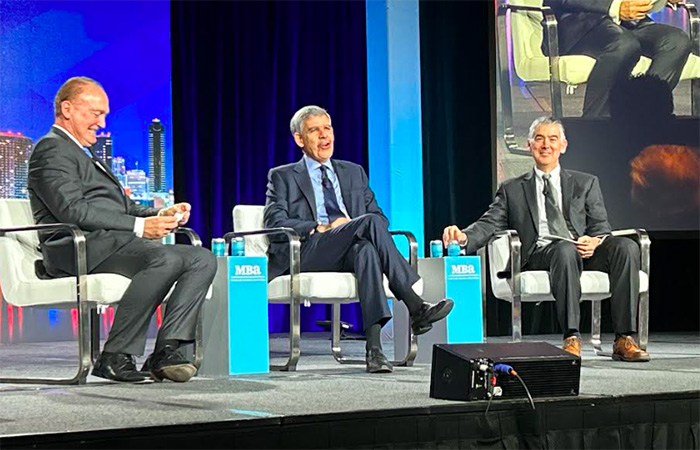
Mohamed El-Erian at #MBACREF24: U.S. Economy Outshines Rest of World

(From left: Mark Jones, Mohamed El-Erian and Mike Fratantoni. Photo credit: Anneliese Mahoney)
SAN DIEGO–Looking at the U.S. economy, 2024 will be solid, but not as solid as last year, predicted Mohamed El-Erian during a session titled “What’s Ahead in the Global Economy” Feb. 12 at the MBA Commercial/Multifamily Finance Convention and Expo.
El-Erian, President of Queens’ College, Cambridge, and Chief Economic Advisor at Allianz, pointed to three factors as influencing the nation’s surprisingly strong economy, despite so many predictions of a recession over the past few years and the headwinds many other nations are experiencing.
For one, people had underestimated the influence of the pandemic buffers on Americans’ wallets. Second, economists misjudged Americans’ willingness to spend. And, the fiscal side is still expansionary–although that’s going to change, El-Erian noted.
Of course, nothing in the economy happens in a vacuum, and the conversation among El-Erian, Mark Jones, 2024 MBA Chairman and President of Union Home Mortgage, and Mike Fratantoni, MBA Chief Economist and Senior Vice President of Research and Industry Technology, took a wide-ranging look at the world economic stage.
For example, China has seen significant economic setbacks in recent months and much of Europe has stagnated, El-Erian highlighted.
“The good thing about starting with the rest of the world is it makes us realize how exceptionally good the U.S. is,” El-Erian said.
Jones and Fratantoni posed a number of questions to El-Erian about his global economic outlook.
One such question, by Fratantoni: Why do so many Americans not feel the economy is doing as well as the numbers indicate?
“It has to do with inflation, it has to do with the initial policy mistake,” El-Erian said. “When you shock someone with unanticipated inflation, it takes a very long time to recover.”
El-Erian was asked to “look into his crystal ball” on the Federal Reserve and its upcoming moves. While he acknowledged he’s been accused of “being too harsh” on the Fed, he also outlined recent “policy mistakes” he believes the body has made, ranging from bad communication to a lack of accountability.
“I think when we look back on this, we’re going to have asked a lot of questions about what went wrong in the structure of the organization itself,” El-Erian said. “Hopefully, once we get out of the whole inflation issue, we’re going to be able to improve the structure of the decision-making process.”
As for the Fed’s approach to quantitative tightening, El-Erian said that until recently, he would have predicted Quantitative Tightening would be like “watching paint dry.” However, he thinks the Fed is starting to realize there are market-functioning issues, and it wouldn’t surprise him if Quantitative Tightening were to become less severe in the next few months.
Looking at the commercial real estate market specifically, El-Erian warned about “noise”–which he defined as people extrapolating from the weakest segment of the market to make decisions.
The way to fight that, El-Erian said, is through information provision, in order to help people see above the noise.
El-Erian also weighed in on the Basel III proposal, a topic weighing heavily on many in the industry’s minds.
“It wouldn’t surprise me if more and more sand was put into wheels,” El-Erian said. “Because I think there’s a recognition that it may be going too far, and sacrifice quite a bit of the efficient functioning systems, and ultimately undermine some of the really important goals.”
